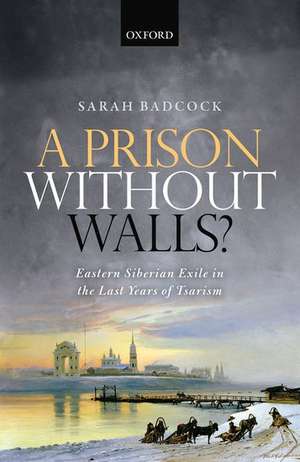A Prison Without Walls?: Eastern Siberian Exile in the Last Years of Tsarism
Autor Sarah Badcocken Limba Engleză Hardback – 13 oct 2016
Preț: 612.01 lei
Preț vechi: 879.19 lei
-30% Nou
Puncte Express: 918
Preț estimativ în valută:
117.13€ • 121.35$ • 97.75£
117.13€ • 121.35$ • 97.75£
Carte tipărită la comandă
Livrare economică 10-17 martie
Preluare comenzi: 021 569.72.76
Specificații
ISBN-13: 9780199641550
ISBN-10: 0199641552
Pagini: 214
Dimensiuni: 161 x 240 x 18 mm
Greutate: 0.46 kg
Editura: OUP OXFORD
Colecția OUP Oxford
Locul publicării:Oxford, United Kingdom
ISBN-10: 0199641552
Pagini: 214
Dimensiuni: 161 x 240 x 18 mm
Greutate: 0.46 kg
Editura: OUP OXFORD
Colecția OUP Oxford
Locul publicării:Oxford, United Kingdom
Recenzii
... a sobering reminder of the cruelty inflicted by the state and by individuals on men, women and children and a testimony to human endurance in the face of suffering.
A Prison without Walls? will likely be considered the definitive work on katorga and exile in early twentieth-century Russia for some time to come.
finely researched, elegantly written and thought-provoking
While Soviet historiography emphasized the cultural benefits that political exiles brought to Siberia, Badcock gives voice as well to the regional authorities and local populations, who articulated the negative impacts of exile on their communities ... Badcock has consulted archives in the Sakha Republic and the Irkutsk Oblast. We hear new kinds of voices in this study, and find descriptions that prove further that state ambitions for forced labour and the misery of prisoners and their families did not begin with the Soviet state.
a notable achievement that will be of interest to scholars of tsarist and Soviet Russia, as well as historians of crime and punishment, and migration.
a most worthwhile book, replete with useful information and evocative description ... as the study of all regions and periods of Siberian history attracts more investigators, they will certainly find that they have a high standard to live up to.
A particular strength of A Prison Without Walls? is Badcock's discussion of the interplay between mobility and stasis in her analysis of the exilic experience.
Badcock deserves credit for having produced an assiduous, enlightening and admirably humane piece of scholarship,one that adds greatly to our understanding of a hitherto obscure and understudied aspect of Russia's imperial experience.
provides a vivid snapshot of the Siberian exile system at a crucial moment in time on the eve of war and revolution, one that should find readers both academic and otherwise, for it would work well in the classroom.
A Prison without Walls? will likely be considered the definitive work on katorga and exile in early twentieth-century Russia for some time to come.
finely researched, elegantly written and thought-provoking
While Soviet historiography emphasized the cultural benefits that political exiles brought to Siberia, Badcock gives voice as well to the regional authorities and local populations, who articulated the negative impacts of exile on their communities ... Badcock has consulted archives in the Sakha Republic and the Irkutsk Oblast. We hear new kinds of voices in this study, and find descriptions that prove further that state ambitions for forced labour and the misery of prisoners and their families did not begin with the Soviet state.
a notable achievement that will be of interest to scholars of tsarist and Soviet Russia, as well as historians of crime and punishment, and migration.
a most worthwhile book, replete with useful information and evocative description ... as the study of all regions and periods of Siberian history attracts more investigators, they will certainly find that they have a high standard to live up to.
A particular strength of A Prison Without Walls? is Badcock's discussion of the interplay between mobility and stasis in her analysis of the exilic experience.
Badcock deserves credit for having produced an assiduous, enlightening and admirably humane piece of scholarship,one that adds greatly to our understanding of a hitherto obscure and understudied aspect of Russia's imperial experience.
provides a vivid snapshot of the Siberian exile system at a crucial moment in time on the eve of war and revolution, one that should find readers both academic and otherwise, for it would work well in the classroom.
Notă biografică
Sarah Badcock was born in County Durham, and lived in the north-east of England until she moved 'south' to study history and roman civilisation at the University of Leeds, where she graduated with first class honours in 1995. She moved back up north to start her graduate studies at the University of Durham's department of Russian studies, and successfully defended her doctoral thesis there at the end of 2000. She spent 2001 studying in archives around Russia, supported by a Leverhulme study abroad fellowship. She joined the University of Nottingham at the beginning of 2002, and has been there ever since as Associate Professor in the department of History. Her research focuses on lower class experience in revolutionary Russia, comparative perspectives on penal systems and use of exile, and lived experiences of punishment.








